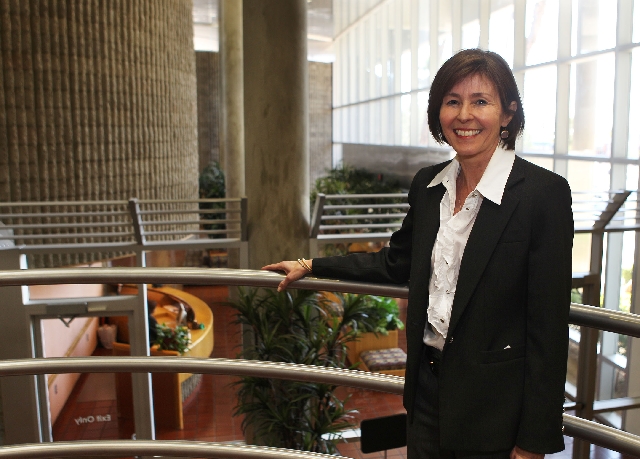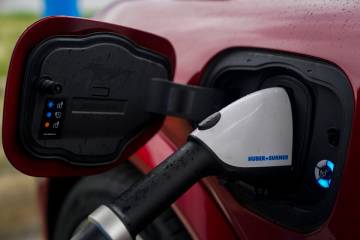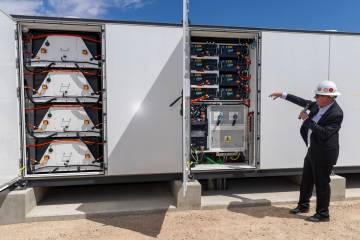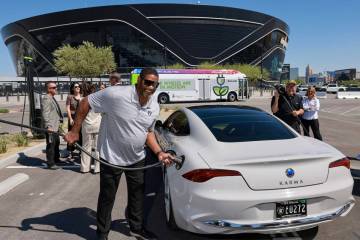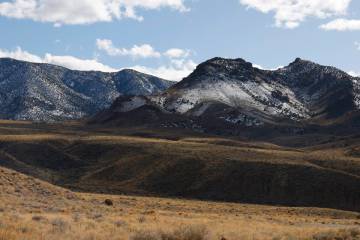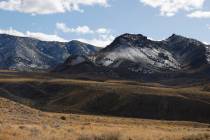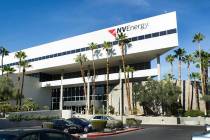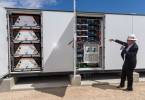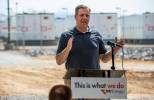NV Energy executive revels in helping community keep lights on
Long before she moved to Nevada, Dilek Samil marveled from afar at NV Energy.
Samil was a power executive in Louisiana in the mid-2000s, when NV Energy went from the brink of bankruptcy to fast-growing utility, building plants at breakneck speed to slash reliance on wholesale power from other states.
Almost three years ago, CEO Michael Yackira invited Samil to join in the transformation. She took over as senior vice president of finance, chief financial officer and treasurer in June 2010, and became executive vice president and chief operating officer two years later.
For Samil, it’s the best possible position. A math whiz who majored in computer science to avoid term papers, she said her work fulfills a need for logic and ration, with a dose of real-world challenges to keep things interesting.
Samil is also in her second year as a board member of Shade Tree Shelter, a haven for women in crisis. It’s a volunteer job that she said makes the challenges at NV Energy look almost easy in comparison.
“Funding has dried up, as it has for other nonprofits. But we’re working on it,” she said. “There are a lot of grandmothers with a couple of bags of clothes climbing into bunk beds at Shade Tree.”
Question: You planned to spend only a couple of years in utilities. Why did you stick with it?
Answer: I absolutely love it. Utilities attract people who want to serve their communities, neighbors and families. They have a deep appreciation for what utilities bring to communities. Our world runs on electricity. Nothing we do in modern times is possible without plugging it in one way or another. I love working with people who keep the lights on, from the folks at the power plants to the people who put up transmission lines to the linemen working when it’s 110 (degrees) in Las Vegas or freezing in Reno.
Question: What brought you here?
Answer: A sense of adventure and admiration for what this company has done — the resilience, coming back from the brink of financial disaster, and then being hit with tremendous growth. I remember sitting in Louisiana, where we were grateful for a half of a percent or 1 percent increase in customers and sales, and seeing what was going on in Nevada (with growth of 5 percent to 6 percent in the early 2000s), and thinking, “Wow, how in the world do they keep up with it?” This company seemed liked it was well-positioned to do amazing things.
Question: How is our power market different from markets in other states?
Answer: Here in the West and in Nevada, for example, renewables, environmental consciousness and sustainability are very much at the forefront. We’re blessed because we have the resources — solar and geothermal — to focus on those things. If you look at a state like New Jersey, they don’t have a whole lot of wind or geothermal, and while they’ve made great progress in solar, the intensity is not there at the level we have.
Nevada has done a great job of appreciating and welcoming renewables, while being mindful of the pocketbook impacts, because right now, although prices have been coming down, let’s face it: Renewables do cost more than conventional generation. But I believe renewables are something we need to keep investing in and doing well.
Question: How does our regulatory regime differ from those in states with more competition, such as Texas?
Answer: The retail side is what’s deregulated in Texas. People can choose who their provider is, but there aren’t multiple distribution lines serving the same customer. So there are still regulated utilities that are just distribution utilities, or power plant utilities. They’re just regulated in a different way. The retail company bundles distribution and generation, puts it together and sells it.
I understand that people want a choice, but the nature of our business is such that you can’t duplicate these assets and make it work from practical standpoint. And I would suggest that the jury is still out as to whether the Texas model or our model works better. It’s really not clear that prices have come down in Texas relative to other markets. We think it’s best for customers if we own the power plants, because we can control costs better. In California, as another example, they’ve decided it makes more sense for utilities to not own their power plants. If you look at prices in California, they’re way higher than prices here, partly because of a lot of different policies. I’m not convinced there’s a one-size-fits-all solution. Different states have different needs, resources and objectives.
Question: What’s a typical day like for you on the job?
Answer: There’s no typical workday. That’s what I love about my job. I spend time out in the field visiting with our linemen. Two weeks ago, I was touring a new transmission line we’re building, and earlier today, I was at our control center on the (Southern Nevada) beltway, sort of the brains of the operation, where our operators make sure the system is reliable and the lights are kept on. My best day is when I’m out in the field talking to our troops about where the company is and where it wants to go. I want to hear from them what they’re thinking and how can we do better. We always want to improve. Complacence is the thing that scares us most. We’re always thinking about how to do things cheaper, better and faster.
Question: How often do people yell at you about their power bill when you’re out and about?
Answer: For the most part, people are polite, but their bill is what they think about when they think about NV Energy. We turn the lights on, we plug in devices and we expect it all to work, but really, we forget about all of that. The only time people think about NV Energy is that one time a month when it’s time to pay up. And particularly in Southern Nevada, in the summer, that’s a big deal. I’m sympathetic. It’s tough economy, and we provide a necessity you can’t live without.
Sometimes, it’s hard to remember what we’re doing as customers that drives the bill. Our CEO likes to compare it to going to the gas station to fill up, but not getting a gas bill until the end of the month. If you got that bill all at once, you’d be horrified. You might forget you drove to San Diego, or that your family was in and you drove back and forth to the Strip a million times.
We’re hoping, with some of our new technologies, to help customers get a better sense of what’s driving their usage so we can help them manage it.
Question: Where was the strangest place a customer approached you?
Answer: I was at the airport, running late as usual, trying to catch a flight to Reno to meet with employees. I didn’t realize I’d left my driver’s license at home until I got to the airport. I somehow talked the TSA agent into letting me through with my NV Energy badge, with my picture on it, but not before he could ask me what we could do about his bill.
Question: People complain about their power bill way more than any other utility bill. Why?
Answer: It is the use in the summer. We have an equal payment program that equalizes payments over the course of a year. We measure the perception of our customers on the equal payment program versus those who enjoy very low bills in February and get the higher-use bills in August, and there’s an appreciable difference. So the hot summer months are what I think drive the perceptions that people have.
Question: NV Energy won’t need a lot of new power plants or other capital investments for the next few years, so what will you focus on going forward?
Answer: It’s a great time to look at our processes and see where we can fine tune everything.
The two areas nearest and dearest to my heart are safety and customer satisfaction. Safety is nothing new for this company or the utility business. While electricity is an integral part of our lives, it is a dangerous business. I want to leave behind a legacy of best-in-class safety performance. I want each of our employees to own it, to embrace it, and to know they can stop work if they feel like something is unsafe. That’s my No. 1 passion. As much as we appreciate the need to keep the lights on, none of that matters if someone gets hurt in process.
Second is the customer. We wouldn’t be in business if it weren’t for our customers. In some respects, we are a monopoly, but that doesn’t mean we take customers for granted. We want to be a company that’s easy to do business with.
Question: What’s next for you and your career?
Answer: I love what I do. I think I’ve got the best job in the company, and honestly, whatever job I was in, I’ve always thought that. I’m not the kind of person who has a five-year plan.
Contact reporter Jennifer Robison at
jrobison@reviewjournal.com or 702-380-4512.
Follow @J_Robison1 on Twitter.
VITAL STATISTICS
Name: Dilek Samil.
Position: Executive vice president and chief operating officer, NV Energy.
Age: 57
Family: Husband, Dino Mendocino; daughters Lara and Danny.
Education: Bachelor of Science in computer science, City College of New York; Master of Business Administration, University of Florida.
Work history: Treasurer, FPL Group and Florida Power & Light Co.; vice president of finance, NextEra Energy Resources; chief financial officer and chief operating officer, CLECO Power in Louisiana; senior vice president of finance, chief financial officer and treasurer, NV Energy; executive vice president and chief operating officer, NV Energy.
Hobbies: Walking, running, hiking.
Favorite book: "A Wrinkle in Time" by Madeleine L’Engle; "Undaunted Courage" by Stephen Ambrose.
In Las Vegas since: 2010.
Quote: "Nevada has done a great job of appreciating and welcoming renewables, while being mindful of the pocketbook impacts, because right now, although prices have been coming down, let’s face it: Renewables do cost more than conventional generation."
NV Energy is at 6226 W. Sahara Ave. It can be reached at 402-5555.



